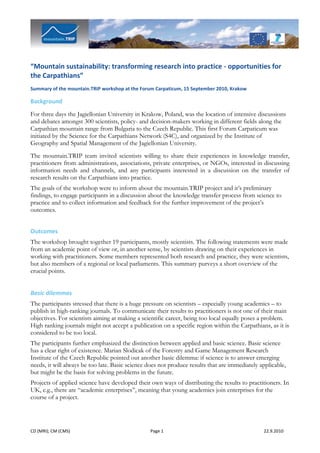
Mountain Sustainability Insights
- 1. “Mountain sustainability: transforming research into practice -‐ opportunities for the Carpathians” Summary of the mountain.TRIP workshop at the Forum Carpaticum, 15 September 2010, Krakow Background For three days the Jagiellonian University in Krakow, Poland, was the location of intensive discussions and debates amongst 300 scientists, policy- and decision-makers working in different fields along the Carpathian mountain range from Bulgaria to the Czech Republic. This first Forum Carpaticum was initiated by the Science for the Carpathians Network (S4C), and organized by the Institute of Geography and Spatial Management of the Jagiellonian University. The mountain.TRIP team invited scientists willing to share their experiences in knowledge transfer, practitioners from administrations, associations, private enterprises, or NGOs, interested in discussing information needs and channels, and any participants interested in a discussion on the transfer of research results on the Carpathians into practice. The goals of the workshop were to inform about the mountain.TRIP project and it’s preliminary findings, to engage participants in a discussion about the knowledge transfer process from science to practice and to collect information and feedback for the further improvement of the project’s outcomes. Outcomes The workshop brought together 19 participants, mostly scientists. The following statements were made from an academic point of view or, in another sense, by scientists drawing on their experiences in working with practitioners. Some members represented both research and practice, they were scientists, but also members of a regional or local parliaments. This summary purveys a short overview of the crucial points. Basic dilemmas The participants stressed that there is a huge pressure on scientists – especially young academics – to publish in high-ranking journals. To communicate their results to practitioners is not one of their main objectives. For scientists aiming at making a scientific career, being too local equally poses a problem. High ranking journals might not accept a publication on a specific region within the Carpathians, as it is considered to be too local. The participants further emphasized the distinction between applied and basic science. Basic science has a clear right of existence. Marian Slodicak of the Forestry and Game Management Research Institute of the Czech Republic pointed out another basic dilemma: if science is to answer emerging needs, it will always be too late. Basic science does not produce results that are immediately applicable, but might be the basis for solving problems in the future. Projects of applied science have developed their own ways of distributing the results to practitioners. In UK, e.g., there are “academic enterprises”, meaning that young academics join enterprises for the course of a project. CD (MRI); CM (CMS) Page 1 22.9.2010
- 2. Insights on communication products and channels The need – in this case of scientists - for integrated databases was stressed by the participants. Be it a database on previous research projects in a specific area, be it a database for protected areas in the Carpathians. We have to keep in mind, though, that any database or information clearing house will have to compete with Google. Looking at the KEO, the Carpathian Environmental Outlook commissioned by UNEP, one participant declared that he would rather search in Google! Practitioners, on the other hand, need short answers to precise questions. There is no one solution valid across the disciplines, across countries, and across target groups. The communication products will have to be for specific regions, as, e.g. the Ore Mountains. Anita Bokwa of the Jagiellonian University stressed that it will be important for mountain.TRIP product development to build on experiences others have made. Dr. Bokwa was a collaborator of the FP5 ESPERE project “Environmental Science Published for Everybody Round the Earth” and her experience with communicating climate change will be valuable for mountain.TRIP. Several participants mentioned the importance of language: in the Czech republic, e.g., the Ministry of Agriculture commissioned a project on forestry in the Czech mountains whose results were successfully disseminated locally, but not further because of the language barrier. Documents do have a clear advantage to video: a document you can search for a key-word, while you have to watch a video in full length until you find the statement you are interested in. Professional journals although being a traditional medium for information exchange, is still considered to be a useful and popular channel for the dissemination of science to practice. The discussants in the workshop were mostly “digital immigrants”, people who were born before the existence of digital technology and adopted it to some extent later. The next generation of scientists, policy makers and stakeholders – the so-called “digital natives” might have a completely different approach to communication technologies. The potential for the use of new media to find information about research results is also determined by a person’s administrative environment. In many Romanian organizations, e.g., it is not allowed to use Skype, or Facebook. A lot of inspiring and important insights for the mountain.TRIP project team! It is now up to us to develop product ideas and prototype communication products in collaboration based on these insights and in exchange with partners from whose experiences we can learn. Claudia Drexler, the Mountain Research Initiative Catalina Munteanu, Centre for Mountain Studies, Perth College CD (MRI); CM (CMS) Page 2 22.9.2010
